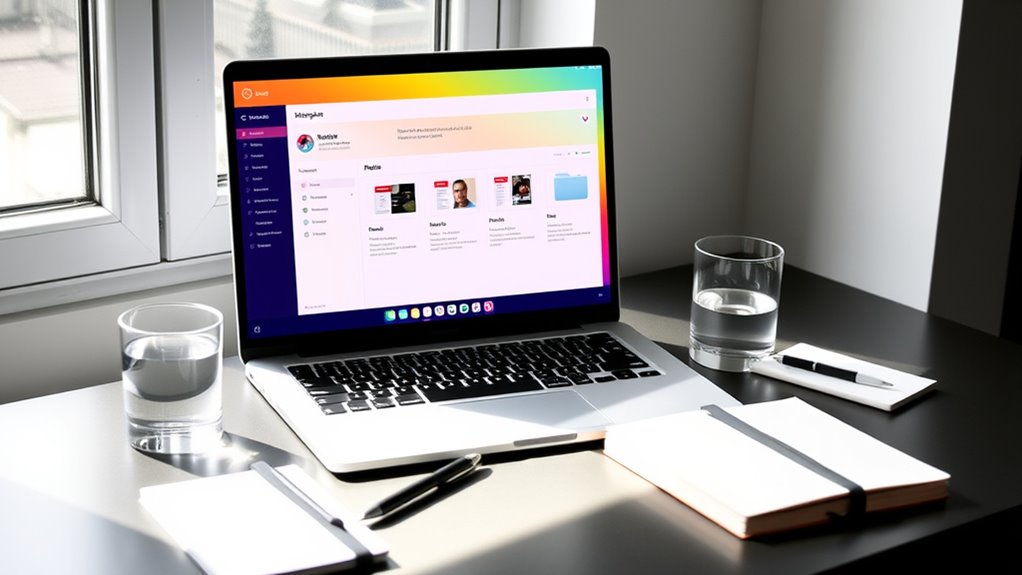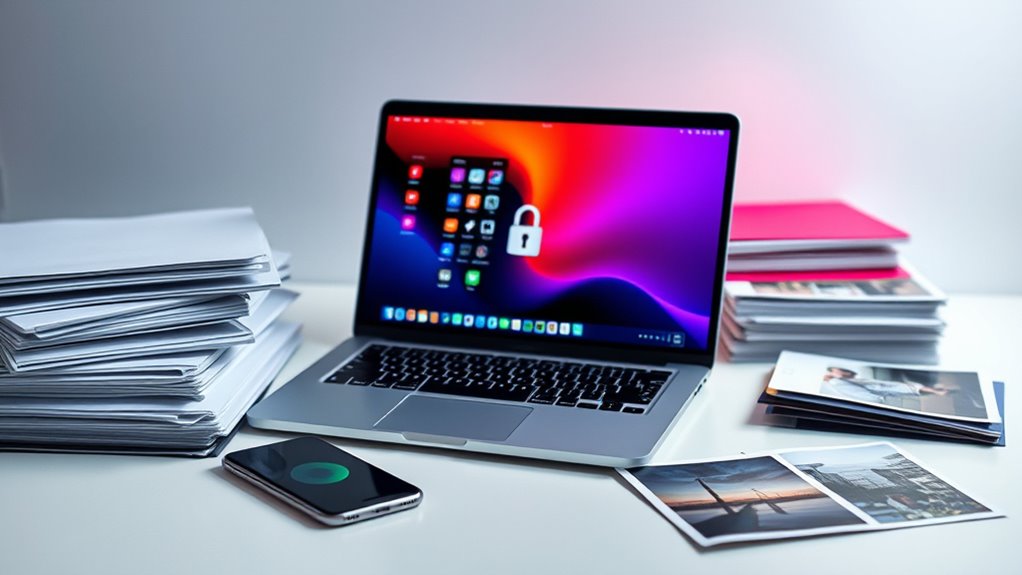To effectively declutter your digital space, start by organizing your files into clear folders like “Work,” “Photos,” and “Receipts,” while deleting duplicates and outdated items. Manage your photos by removing blurry or irrelevant images and categorizing the rest. Use a password manager to store and update strong passwords, removing unused accounts for security. Regular maintenance keeps your devices running smoothly and reduces stress. Keep going to discover more tips for a clean, efficient digital environment.
Key Takeaways
- Categorize and delete unnecessary files and media regularly to free up storage space.
- Organize photos into folders by events or dates and delete duplicates or irrelevant images.
- Use a password manager to securely store, generate, and update strong passwords for all accounts.
- Back up important data to cloud services or external drives to prevent data loss.
- Schedule routine digital maintenance to optimize device performance and reduce digital clutter.

In today’s digital world, cluttering your devices with endless files, apps, and notifications can feel overwhelming. Every photo you’ve ever taken, every document you’ve saved, and every password you’ve created adds up, making it hard to find what truly matters. Without regular decluttering, your device’s performance can slow down, and your mental load increases as you sift through clutter to locate important information. Taking the time to organize your digital life isn’t just about tidiness; it’s about reclaiming your time and reducing stress.
Start by tackling your files. Think about the types of documents and media you store—work files, personal photos, downloads, and miscellaneous documents. Create clear folders for different categories, such as “Work,” “Photos,” “Receipts,” or “Personal.” Delete duplicates, outdated files, and anything you no longer need. Use search functions to locate large files taking up space and consider backing up important data to an external drive or cloud storage. Regularly maintaining this system means you won’t get overwhelmed every time you open your device.
Photos are often the most cluttered digital files. Instead of storing hundreds of random images, set aside time to review and delete blurry, duplicate, or irrelevant photos. Organize the remaining ones into folders based on events, dates, or subjects. Use tagging or face recognition features if available to make future searches easier. Consider creating albums or collections that tell a story or highlight special moments, rather than keeping every picture you’ve ever snapped. This not only declutters your gallery but also makes it more meaningful and easier to enjoy.
Passwords are another critical area. Over time, your collection of login credentials can become chaotic, making it difficult to remember which password belongs to which account. Use a reputable password manager to store and generate strong passwords securely. This way, you only need to remember one master password. Regularly review your saved passwords and update any weak or outdated ones. Remove access to accounts you no longer use to reduce potential security risks. Organizing your passwords not only improves security but also saves you time when logging in.
Frequently Asked Questions
How Often Should I Perform a Digital Declutter?
You should perform a digital declutter at least once every three to six months. Regularly organizing your files, deleting unnecessary photos, and updating passwords keeps your digital space efficient and secure. If you handle a lot of data or see clutter building up quickly, consider doing it more often—monthly or quarterly. Staying consistent helps prevent overwhelm and maintains a smooth, stress-free digital environment.
What Tools Can Help Automate Digital Cleaning?
You can automate your digital cleaning with tools like CCleaner, which scans and removes unnecessary files effortlessly, or LastPass, which securely manages your passwords. These tools act like digital assistants, freeing you from tedious chores. While they handle routine tasks, remember to review their results periodically. Using automation lets you focus on more important things, turning digital clutter into a thing of the past with minimal effort.
How Do I Securely Delete Sensitive Files?
To securely delete sensitive files, you should use specialized software like Eraser, CCleaner, or BleachBit. These tools overwrite your files with random data, making recovery nearly impossible. First, select the files you want to delete, then choose the secure deletion option. Always double-check that you’re deleting the correct files, and remember to empty your recycling bin afterward to make certain complete removal.
Can Digital Decluttering Improve Device Performance?
Absolutely, decluttering your digital space can boost your device’s performance. By removing unnecessary files, photos, and apps, you free up storage and reduce system strain. This cleanup helps your device run smoother and faster, making you wonder why you didn’t do it sooner. Ironically, a little effort in organizing your digital life can save you time and frustration, giving your device the boost it desperately needs.
How Do I Organize Shared Family Digital Spaces?
You can organize shared family digital spaces by creating clearly labeled folders for different categories like finances, photos, and documents. Set permissions so everyone has access but can’t accidentally delete important files. Use consistent naming conventions for easy searching. Schedule regular cleanups where everyone reviews and updates files. Communicate about what goes where, ensuring everyone understands the system. This keeps your shared space tidy, accessible, and stress-free for all family members.
Conclusion
Taking time to declutter your digital life can boost your productivity and reduce stress. Did you know the average person spends over 3 hours a day managing digital clutter? By organizing files, deleting unused photos, and updating passwords, you reclaim valuable time and protect your privacy. Start small today—you’ll be amazed at how much lighter and more focused you’ll feel. A cleaner digital space leads to a clearer mind.









